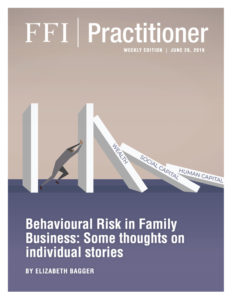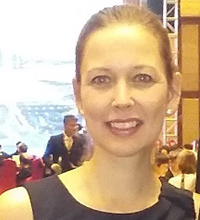
View this edition in our enhanced digital edition format with supporting visual insight and information.
This week’s FFI Practitioner dives into risky individual behavior within the family enterprise which, if ignored, can impact the performance of the business and the unity of the family. Thank you to Elizabeth Bagger, director general of the Institute for Family Business, for her examination of the topic and explaining how helping individuals become aware of this behavior can transform their story into their greatest asset.
What are behavioural risks in family firms? They are those challenging behaviours that individuals within the family business system sometimes exhibit, representing a threat to the stability of family or business relationships—sometimes both. They are individual behavioural risks that will not easily be solved by having the right governance structures and processes in place. This is not to undermine the importance, relevance, or power of structures and processes, far from it. Structures and processes can play an important role in the life of a family business.
However, individual members of a family business system carry their own pasts and stories, and sometimes, if unchecked and unchallenged, the resulting behaviours can get in the way, impacting interactions with the family unit and/or the family business.
One way to think of these behavioural risks is to think of them in the form of ‘gigs’—behaviours people exhibit and masks people hide behind to protect themselves. Gigs people play can take the form of pleasing others, manipulating to get their way, acting as victims, or by coming to the rescue of those they see as incapable of reaching their own conclusions, goals or aspirations—or people may constantly fight for their “right to be right.”
These gigs or behaviours will invariably get in the way of open family communication, effective decision making, and stewardship of a family’s assets. And hence, sometimes, before advisors can help a family to create family and/or business governance that works, they have to look carefully at family members’ beliefs and behaviours and how they get played out in the family group, and the individuals within it, working and operating to the best of their abilities.
According to the Veritage model* of family governance, a family’s wealth is made up of human, financial, and social capital. Whilst it is important to nurture all three, unless the human capital is strong, the other capitals are at risk. An often-underdeveloped area in this model is the individual within the family system. Each individual needs to feel competent and confident in himself or herself first. So, what can advisors and consultants do to help their clients strengthen the individual human capital?
One of the first steps in the Veritage process is to assist individuals in becoming aware of the stories they carry within themselves about themselves—assisting people to identify a belief that is getting in the way and where it came from. For example, what was the event that caused this belief? What thoughts and subsequent feelings did it lead to? What belief was adopted as a result and how does that belief play out in current behaviour?
This simple exercise can be both eye opening and cathartic for individuals, especially when they look at this first for themselves and, later, through the lens of their relationship with money – financial capital. Making the connection between how people ‘do’ relationships and money can be very powerful. And it may come as a surprise to people to see that their beliefs about money and how they treat it are a direct reflection of how they understand and treat relationships—whether that’s as a someone who spends, invests, values, or fears money, and relationships. In this conceptual framework, individuals either spend relationships, value and contribute to them, invest in them to make them grow, or sabotage them—often fearing that they (the individuals) are not worthy.
These behaviours are human and risky, and whilst they may not be helpful, they are not necessarily dysfunctional—just things to become aware of and work with to get on the other side to a safe space. This passage is part of the beauty of working with family enterprise clients. Often, in the process, the individual story is transformed to become a person’s greatest asset rather than a behavioural risk. Helping a family member, through support and coaching, to move from feeling unworthy of what they have, or not valued by the family, to realising their own inherent worth will not only help the family member feel happier and better in their relationships, it will also pave the way for the realisation of the unique abilities and potential in the individual that can make an invaluable contribution to the business.
“There is a crack in everything / That’s how the light gets in”—as the song goes.** That is true of family business too, and helping families reach their safe space, through the stories of one individual at a time, carries within it the power of true transformation.
References
- *Veritage. “Veritage Tools.” Accessed June 13, 2019. https://veritage.ca/families/veritage-tools/
- **Leonard Cohen, vocalist, “Anthem,” by Leonard Cohen, track 5 on The Future, Columbia 1992.
About the Contributors

Elizabeth Bagger is the director general of the Institute for Family Business in the UK. She holds an FFI Certificate in Family Business Advising, is a Veritage trained Family Business Coach, a certified facilitator, a 2nd generation family member and non-executive director of her own family firm and a passionate advocate for family business. She can be reached at Elizabeth.Bagger@ifb.org.uk
About the 2019-2021 FFI UK/Europe Regional Planning Committee
The purpose of this committee is to expand the presence of FFI as an organization and the FFI members themselves in UK and Europe area in the coming years, to build enthusiasm for the 2021 October conference in London, and to promote the multidisciplinary, global approach that is at the core of FFI’s mission “to be the most influential global network of thought leaders in the family enterprise field.” This is the first in a series of articles from the committee members. On September 24, the UK/Europe Regional Committee will host a master class with Belgium doctor, Kris Verburgh, author of The Longevity Code, at KPMG Canada Wharf in London.

View this edition in our enhanced digital edition format with supporting visual insight and information.



